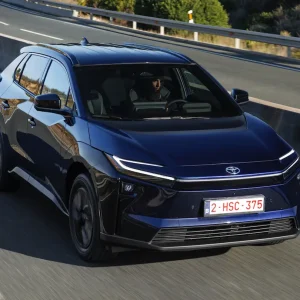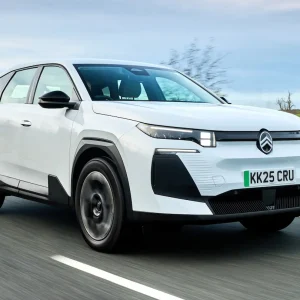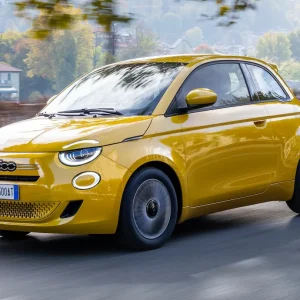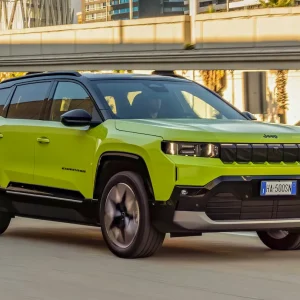Since its launch in 2010, the Nissan Leaf has become one of the most recognisable electric cars on sale today.
Refreshed in 2016, the Leaf is now in its third iteration and the headline changes include a new 30kWh battery pack, which increases the theoretical range of the car from 124 miles up to 155 miles per charge. A refreshed seven-inch touchscreen system is also installed alongside a new smartphone app, which includes a feature that will navigate you to the closest available charging points.
Driving electric
We’re getting pretty used to the peacefulness of EV driving now and the Leaf is as easy and relaxing to drive as they come. Thanks to the immediate torque, the car feels quick to respond away from the lights and is nippy around the town. Officially, it will complete the 0-62mph sprint in 11.5 seconds.
There are a couple of different driving modes to chose from. Opt for ‘D’ for the best performance and power, while placing the car into ‘eco’ dulls the performance for greater range and triggers more aggressive regenerative braking.
The new battery is actually the same size as the 24kWh battery, which is still available on lower grades and costs around £1,600 less, but weighs around 21kg more. Officially, this Leaf will now travel 155 miles between charges, although it’s completely dependent on how you drive and the road and weather conditions.

In the summer, a conservative drive, staying mainly in the city, should achieve 100 miles per charge; expect this figure to halve in winter and on the motorway.
On the road the steering is responsive. It’s not a car you’ll feel confident throwing into corners at high speeds, however, but performs admirably when asked, especially when you consider the extra weight this Leaf carts around.
Ride quality is also adequate (the 17-inch alloys on our test car make it a little firm) and comfort levels, largely thanks to the absence of engine noise, are very good indeed. When you’re not worrying about range or having other drivers cut you off at junctions, you’ll find driving the Leaf a pretty stress-free and enjoyable experience.
Using the fast-charging network will bring back 80% of the battery’s life in 30 minutes. The Leaf takes 12 hours to charge using a domestic plug, and plugging into a fitted wallbox will take around seven hours.
Tekna luxuries
You can currently buy the Leaf in three trims. Here we’re testing in top-of-the-range Tekna, and it comes with plenty of kit as standard.
Highlights include heated seats and steering wheel, 17-inch alloy wheels, leather interior, cruise control, automatic lights and wipers, reversing camera and a Bose sound system with seven speakers.

The new infotainment system is a marked improvement over its predecessor and includes a number of useful features like a 3D sat-nav, a larger eight-inch screen and onboard tracking capabilities, which will be particularly useful for fleets. Overall it still lags behind the competition in resolution, usability and quality, though.
Inside there are a number of cheaper plastics lurking too, which is probably the car’s biggest letdown. There’s plenty of space for all occupants, though, and the boot, at 370 litres, although impeded by the battery pack and our test car’s Bose sound system (which uses up 15 litres), is one of the best for electric cars and should prove practical enough for a couple of overnight bags or the weekly shop.
Residuals still a key issue
Like most electric cars, residual values are a key issue for the Leaf and one of the main reasons for the car’s high 63.5p whole-life cost figure. The Leaf’s 17.2% residual value is particularly low next to rivals like the Renault Zoe and BMW i3, although Nissan claims running costs could be as little as 2ppm if the most cost-effective charging (like at night) is used.
The new 30kWh Leaf moves the game forwards for Nissan, but rivals have caught up and its poor residual value figure makes the car that little bit too expensive.
Nissan Leaf 30kWh Tekna |
| P11D Price: £31,825 |
| On sale: Now |
| Residual value: 17.2% |
| Charging cost: £980 |
| Service, maintenance & repair: £1,557 |
| Cost-per-mile: 63.5p |
| Official range: 155 miles |
| CO2 (BIK Band): 0g/km (7%) |
| BIK 20/40% per month: £37/£74 |
| Boot space: 355 litres |
| Battery size/power: 30kW/111hp |





